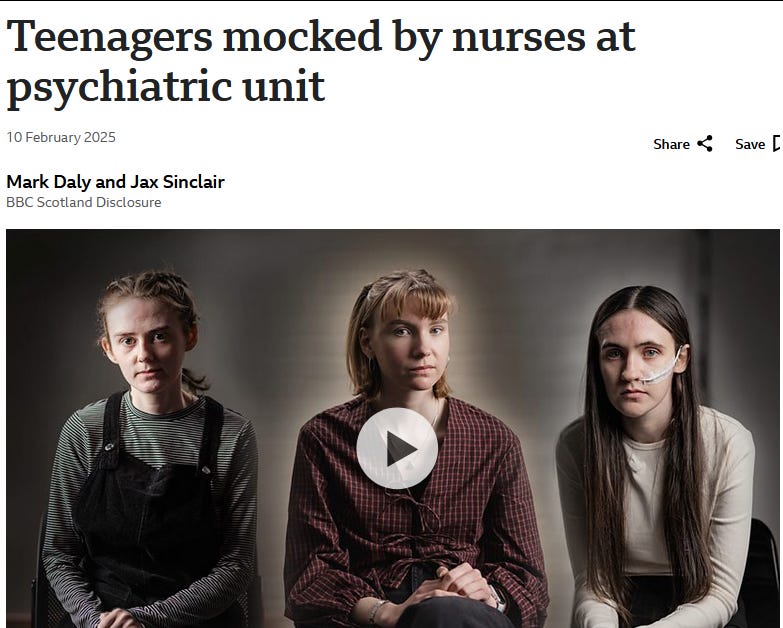News Roundup (Nov. 2024 to March 2025)
Broadened laws, damning investigations, brutal testimonies, and more in the news about involuntary commitment
Here, a roundup of some of the more important or interesting news reports on involuntary commitment from November of 2024 to March of 2025. I loosely grouped them and frequently bolded the key issue in each, so as to help you scan for what you’re most interested in. The main headings are:
Investigations into abuse, corruption, and fraud
Expansive and expanding uses of force
Testimonies about force
Stories from non-consenting children and youth
Opinions—on point and off
Nice!
Okay, let’s get going…
Investigations into abuse, corruption, and fraud
The U.S. Department of Justice launched an investigation to determine whether Michigan is keeping large numbers of people locked up in psychiatric hospitals unnecessarily. As I explore in Your Consent Is Not Required, this is just the latest state in a long list of such cases in states around the country.
More evidence has emerged of rampant corruption and fraud at for-profit addiction-treatment clinics across America. But will this evidence make politicians rethink laws that increasingly allow such places to forcibly treat people? Or how high up does the profiteering go?
The Arizona Center for Investigative Reporting described how “white vans were appearing on reservations and people with addiction were disappearing." Investigators found some $2.5 billion in fraud at abusive sober homes, where at least forty Arizona Indigenous people died.
In New Jersey: “State watchdog finds millions of dollars in fraud at ‘New Jersey’s worst nursing home’”. That headline says a lot – i.e. it’s possible to make millions of dollars off destitute nursing home residents, many held against their will. This in turn explains a lot about contemporary involuntary “care.” It’s not discussed here but, as I also found when researching Your Consent Is Not Required, it’s now common for people well under 65 years of age and labeled with mental illnesses to be compelled to live in nursing homes.
In the UK, free addiction helplines were reprimanded by the nation’s advertising regulator for secretly taking kickbacks from treatment providers. It was unclear how many of the clients/victims ended up “referred” into what became forced interventions.
I recounted in my book journalist Tony Kovaleski’s stellar investigative work over two years exposing a corrupt psychiatric hospital in Denver that ultimately led to the government closing the hospital. The psychiatric hospital eventually re-opened under new owners. Yet soon, a nurse who’d worked under the new owners described physical and sexual assaults at the hospital, and said, “Prisons are offering better care." Kovaleski recently reported that this new hospital will be close in March.
So, sometimes it can be difficult to feel like such investigations really make a difference over the long run. For example, when commitment laws already give broad discretion for legally using restraints, seclusion, and forced drugging, imagine how abusive the practices must be when there is what the Disability Law Center described as continuing “illegal” uses of restraint, seclusion, and forced drugging at Massachusetts’ Bridgewater State Hospital. Unfortunately, as the attorneys noted, these troubles at Bridgewater have continued and been exposed and continued and been exposed… and continued… as the years and decades have gone by…
“What should be places of recovery have, for too many people, become places of pain and fear. Compassionate and therapeutic care is now, in many cases, the exception not the norm.”
There were some equally revealing reports recently from the UK as well. An article about findings from UK’s Health Services Safety Investigations Body included this quote: “Dr Sarah Hughes, chief executive of Mind, said: ‘This report reveals the brutal truth about the state of mental health hospitals, which is that they are now so broken they are ‘re-traumatising’ patients. What should be places of recovery have, for too many people, become places of pain and fear. Compassionate and therapeutic care is now, in many cases, the exception not the norm.”
Relatedly, it was found that face-down restraint was used in England mental health facilities 5,247 times in 2023--nine years after the government ordered an end to the dangerous practice.
[direct link to website post here]
Expansive and expanding uses of force
More commitment—evidence be damned. After the Trump Administration promised to release him from criminal charges, New York City Mayor Eric Adams renewed his efforts to expand involuntary commitment through various methods. Too many articles like this one in Gothamist essentially supported his plan by never mentioning that there’s virtually no reliable scientific evidence involuntary psychiatric treatment helps anyone or anything. Some articles do mention that force raises civil rights concerns—but that idea gets scoffed at by many who, such as this journalist and this politician in Canada, view people with mental disorders as like car-crash victims who are “unconscious.”
Ever more people get to commit. Also in New York, a state bill (as of April 2025 in committee) would give the powers of directing police and initiating psychiatric holds to social workers, counselors, marriage therapists, and many others. That’s worrisome enough, but shockingly, the press release and even the official summary of what the bill is about fail to mention another very concerning aspect of the bill. Jump to page 22, and the bill expands the “powers of specialized staff of adult care facilities.” It’s already a major driver of short-term psychiatric detentions as staff at group homes and other community adult care facilities use threats of involuntary detentions and forced drugging to help manage and control the behaviors of residents—and this bill appears to officially sanction and strengthen that practice. This time, at least one New York news outlet did allow Alliance for Rights and Recovery’s Harvey Rosenthal to correctly state: "Those are tough-sounding but terribly false solutions that would simply force people into services and systems that have already failed them far too many times in the past." Notably, a prominent NYC mayoral candidate running against Adams pledged to increase non-coercive Housing First homes—which sounded good and sensible until, in the same presser, he pledged to also simultaneously expand the commitment powers of those same above-named workers who’d be staffing or providing support to those “Housing First” homes.
Jail or commitment. With even more aggressiveness, in Philadelphia, a neighborhood with street problems has implemented its own special "fast-track court”—the purpose of which is to capture people guilty of minor offenses, who previously would have gotten small fines, and now simply immediately give them the “option” of going to jail or accepting forced psychiatric tranquilizing.
AI gets to commit people, too. A legislator in Missouri heard bad things about developments in the ways 988 calls get responded to, and decided to test-contact it herself. First, she just got a series of responses from an AI bot. Then, she escalated to claim she had a gun to her head, and that triggered a police intervention. At no point did she get to interact with any actual person! Instead of being thanked for exposing these ridiculous policies and practices at 988, the politician was put under criminal investigation for her ruse. I suspect that, as 988 administrators implement more uses like these of AI to monitor calls, train staff, and launch alerts, 988 will become ever more this kind of “automated policing” of people’s feelings, thoughts, and statements—especially if, as is occurring, call rates go up even as funding cuts come down.
Commitment for Long Covid. When TIME magazine reports on something, you know it’s probably even more common than it may seem. Dismissed and disbelieved, long COVID patients are getting forced into psychiatric wards. “Emergency rooms are dangerous places for people with Long COVID,” said David Putrino, of New York's Mount Sinai Health System.
Commitment for being pregnant. Another expansion of forced psychiatric powers that I examine in Your Consent Is Not Required: WFMY News in Vermont recently reported on an ACLU lawsuit asserting that the state child welfare agency “relied on baseless allegations about a pregnant woman’s mental health to secretly investigate her and win custody of her daughter before the baby was born." A staff attorney from Pregnancy Justice said, "While it’s unclear how common such scenarios are across the country, several states allow the civil commitment of pregnant people in order to take custody of a fetus."
“Treatment” in prisons. An interesting article in The Atlantic described the latest dubious tactics drug companies are using to “persuade” prison wardens to use long-acting antipsychotic tranquilizers on inmates. Oddly—given the nefarious practices he was describing—journalist Max Blau seemingly still believed that the core driver was ultimately to “help” these inmates. But as Anthony Ryan Hatch described in Silent Cells, alleged rates of mental disorders in prisons appear to often just be a justification to use these powerful, debilitating drugs for inmate control.
Commitment for brain injury. A severely under-discussed but worsening problem is the rising rates of serious brain injuries among people who are getting forcibly treated—people who’ve experienced recreational drug overdoses or taken some of the more powerful psychotropics for prolonged periods. Health Justice discusses this in some depth on their blog: “The lack of awareness and focus on brain injuries while in involuntary treatment by medical practitioners, including those in mental health, and by policy makers and legislative decision makers undermines the care that people with brain injuries need by jeopardizing their health further and violating human rights.”
Toughening CARE Courts, increasing conservatorships, building larger facilities. In San Diego, California, CARE Court was reportedly being implemented as the government promised the public it would be--as a voluntary program. This prompted San Diego Mayor Todd Gloria to speak out with outrage, and sponsor state legislation to make CARE Courts more explicitly about forcing people living on the streets into long-term conservatorships. In a commentary in Psychiatric Times, psychiatrist Nicolas Badre and sociologist Alex Barnard raised concerns about such uses of conservatorships to seize control of people’s lives and forcibly drug them indefinitely, and correctly noted that there is “still no consensus on when involuntary treatment works, for whom, and to what it is needed.” Nevertheless, institutionalization of these people will likely be intensified as California recently got a legal waiver from the Centers for Medicare and Medicaid Services to build larger psychiatric facilities.
Is it easier to see unjust expansions to commitment when they’re in other countries? A transgender woman won a lawsuit in China for being forcibly subjected to electroshock therapy at a psychiatric hospital to "help" i.e. "convert" her. The case rightly raised international concern – however, in the story it’s hard to find much that occurred that’s not also common in western countries. Similarly, the BBC reported on the rising use of involuntary commitment against social dissidents in China. "The psychiatric department has a type of admission called 'troublemakers', one doctor told us." Undiscussed: How different is a Chinese “troublemaker” from a Western resident behaving in “disturbing” ways and appearing to be a “danger”? And again similarly, an Iranian protestor was forced into a psychiatric hospital after walking in the streets in only her underwear, in protest after “being physically assaulted by campus security guards… for failing to comply with the strict dress code imposed on all Iranian women.” Was her behavior legitimate protest or evidence of mental illness? Maybe any creative, impassioned protests can appear "deranged" to some?
Testimonies about force
In a blog post criticizing legislation to expand ECT treatment in Connecticut, Christopher Dubey wrote, "being forced to have ECT was not a positive experience at all. It was one of the most traumatic experiences of my life...I felt deceived, violated, and abused."
With expansions to involuntary commitment for substance use being proposed as frequently in Canada as in the U.S., Canada’s CBC News produced an in-depth look at Washington state’s mental health laws. It includes the painful story of Ricky Garcia, who helped create "Ricky's Law" to make it easier to commit people who use substances. Garcia himself was then later forcibly detained repeatedly under this very law he helped get passed. His best friend of decades said, "the trauma of detainment was too much for him” and, in 2023, Garcia fled to Oregon, “to escape his own law.” His family coaxed him back to Washington and into treatment—where he soon died. The cause of Garcia’s death is under investigation.
Non-consenting Children and Youth
“Two girls fell in love at a camp for ‘troubled teens’ and made an audacious escape. Their captors weren’t far behind," reported The Guardian—the story exposed (yet another) mental health facility for children and youth, this one in Arizona, that is filled with dark and gruesome stories of what involuntary "mental health care" for children and youth all-too-often means.
And lest anyone think such practices are confined to the U.S. or to unregulated facilities, young people detained at a major psychiatric hospital in Scotland described their experiences to the BBC as being “treated like an animal.” Nurses called the children "pathetic" and "disgusting," they stated, and drugged them until they were "walking zombies."
Meanwhile, there was yet another article about the expanding uses of surveillance systems by ordinary schools to monitor young people’s emotions, behaviors, and communications. Algorithms “detect” concerns and fire off alerts to trigger unrequested mental health interventions. Articles like these often point to many of the harms of these systems, while the most common retort is essentially, ‘'But we're TRYING to help.' That is, all of this appears to be mainly about virtue signaling and liability protection for school administrators.
Opinions—on point and off
This excellent article discusses how "physician assisted suicide" has been politically transformed into "medical care." That is, it's no longer a person's right to request medically assisted death, but ever more often it’s a doctor's obligation to propose and promote it. This is, of course, especially problematic where doctors have, on the one hand, the power to lock people up and forcibly treat them for expressing suicidal feelings and, on the other hand, the power to give those same people medically assisted death instead. An illustrative example of how twisted this situation is already becoming in Canada: A man was involuntarily committed at a psychiatric hospital in British Columbia (which has the most extreme rights-stripping mental health laws in North America). Then, while out on a day pass, the man was granted the right to medically assisted death and got it. His family is suing pretty much everyone…
Very few academics research and write critically on involuntary commitment in Canada, so it was good to see University of Ottawa law professor Emmanuelle Bernheim’s article in The Conversation: “they often suggest homelessness is due to mental health issues or addiction, while research shows that financial difficulties are the primary cause..."
It’s certainly disturbing to see how U.S. Immigration and Customs Enforcement (ICE) is increasingly arresting people without charge and making them disappear into unregulated places. And ICE absolutely should not be raiding hospitals. But it was either naïve or grievously misleading for psychiatrist Eric Reinhart to critique ICE practices by arguing in Slate that hospitals are sanctified "spaces of care" free of "surveillance, policing and punishment...fear or judgment.” In fact, as this post alone shows (and I explore at length in my book), hospitals have long been deeply involved in policing, especially with respect to forced psychiatry, substance use, runaway children, family services etc. Reinhart shouldn’t hide that reality merely to try to buttress his anti-ICE arguments—instead, he could have used the opportunity to advocate for hospitals to truly, at last, fulfill that ideal.
Nice!
Journalist Michael Simonson (himself a psychiatric survivor) reported in Reason how a court-appointed lawyer barely put up a fight as a judge approved forced electroconvulsive therapy for David Russell in Minnesota. But thanks in large part to a MindFreedom International campaign and Simonson’s own dogged efforts, a more responsible attorney eventually agreed to take the case, and got the forced treatment dropped virtually immediately and Russell freed.
And unlike the other aforementioned political leaders, Wab Kinew, Canada's new, first Indigenous premier, at least temporarily stepped outside the box of forced psychiatry when he pledged that the province of Manitoba would get rid of homeless encampments by implementing Housing First. The only mention of "force" in his plan was that no person should be "forced to sleep outside."











At a time of overwhelming numbers of stories of backwards and regressive moves on the part of our political “leaders”, this latest PsychForce Report, with a compilation of events reported between November 2024 and March 2025, leaves me stunned, and shaken to my core. Perhaps you can write a PsychForce Report about what we can do to speak out, support organizations that are working to protect our human rights, and spread the word about these issues? Thank you, as always, for your tireless and vital research and impeccable journalism, and for being a voice for the too-often voiceless, Rob. Your work is so important.
Vital investigative reporting exposing the systematic violence and corruption against people with psychiatric diagnosis. Please subscribe, share, and support Rob’s work.